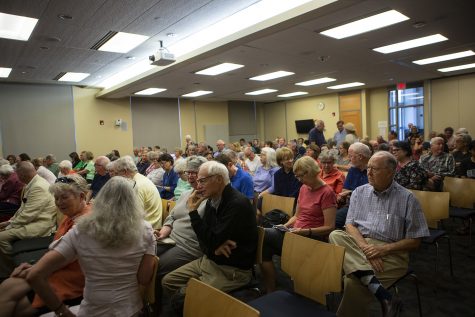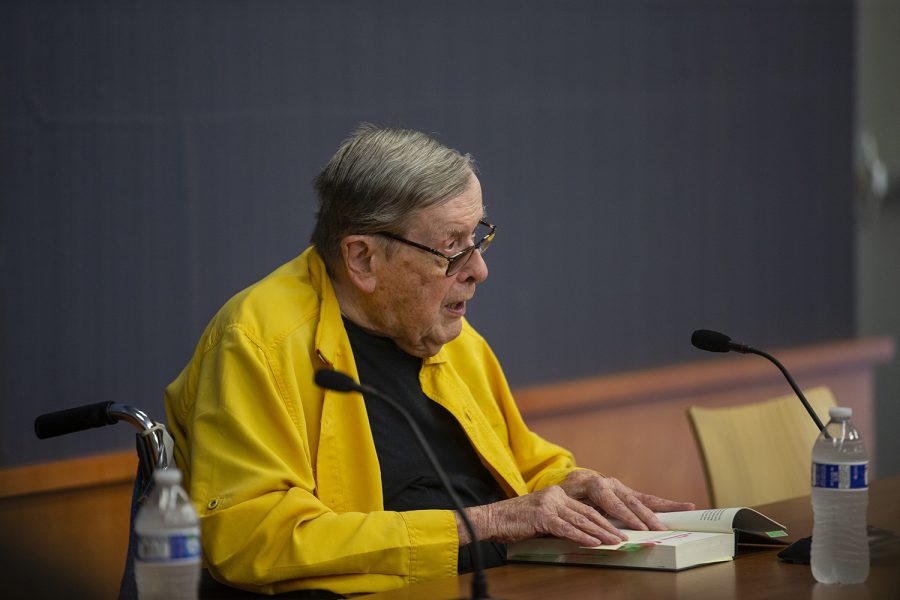Sandy Boyd reflects on a lifetime of scholarship, leadership at the UI
Former UI President Sandy Boyd read from his memoir, A Life on the Middle West’s Never Ending Frontier, in front of friends and readers July 28 at the Iowa City Public Library.
Former President of the University of Iowa Sandy Boyd reads from his memoir at the Iowa City Public Library on July 28, 2019. Boyd memoir is titled A Life on the Middle West’s Never-Ending Frontier. (Katie Goodale/The Daily Iowan)
July 28, 2019
Willard “Sandy” Boyd, one of the University of Iowa’s longest tenured presidents, almost never got the job of president in the first place.
Then-state Rep. Chuck Grassley, among others, opposed Boyd’s appointment as being perceived as too sympathetic to the “radical interests” of students.
Boyd did end up getting the job, and he led the UI through more than a decade of change and growth.
Boyd shared this anecdote and others in a reading from his memoir, A Life on the Middle West’s Never Ending Frontier, at the Iowa City Public Library on July 28.
The event was well-attended, with former faculty, alums, and community members gathering to hear Boyd speak on his life as a lawyer, law professor, dean, and UI president.
Boyd came to the UI in 1954, serving as a professor in the law school. The building is now named after Boyd.
RELATED: University of Iowa history, told through the head Hawks’ eyes
He served as president through a tumultuous time at the UI, as the institution began to grow in enrollment numbers as well as face a considerable number of student protests and resistance through the 1960s and early 1970s.
After reading from his memoir, Boyd took questions from the audience.
Audience member Ron Clark told Boyd he was a student during the early ’70s and was curious to know Boyd’s thoughts on current issues at the UI, including the Labor Center, which was nearly closed in 2018 because of a lack of funding.

Audience members, including former U.S. Rep. Jim Leach wait for former President of the University of Iowa Sandy Boyd during his reading at the Iowa City Public Library on July 28, 2019. Boyd’s memoir is titled A Life on the Middle West’s Never-Ending Frontier. (Katie Goodale/The Daily Iowan)
“In 1971, I was one of the people affected by the turmoil. I was pretty angry. In 1978, I came to grad school, [and] I was amazed by how much more effective of a president you were,” Clark said, to laughter from the audience. “One of the great gifts you’ve given to the university was the nonprofit center here, which is an underpraised, lesser-known institution that’s done great service for a number of nonprofits. What do you think is the future here for that kind of institution?”
RELATED: UI legend reflects on 50 years fighting for gender equality in intercollegiate athletics
After spending 15 years as the director of the Field Museum of Studies in Chicago from 1981 to 1996, Boyd returned to the UI to teach law. During his return to the UI, Boyd was central in developing the Larned A. Waterman Iowa Nonprofit Resource Center, which provides education and resources for nonprofit organizations in Iowa.
As for the Labor Center, Boyd said in this current legislative atmosphere, the center should rely on outside funding.
“I knew the day would come when some of these centers would have to be retrenched, because the primary thing is the teaching with the enrolled students,” Boyd said. “We protected ourselves — we got some other money and earned some … money and had an endowment so that we could go forward. Why I say that is: It means that if a center wants to stay in business, it’s got to do a lot of hard work to get it done, given the environment we’re in where the Legislature will always be cutting.”
Boyd also offered his opinion on the continuing role of greek life on campus, noting that while greek programs have a place at the UI, they shouldn’t revolve around drinking.
“I think it’s just insane to not have a program that’s more than just drinking,” he said.
Many of the audience’s questions referred to Boyd’s role in a time of a UI cultural of institutional change.
“Thank you for your early and constant support of women’s athletics and women in general,” Peggy Burke, a professor emerita in health science, told Boyd.



